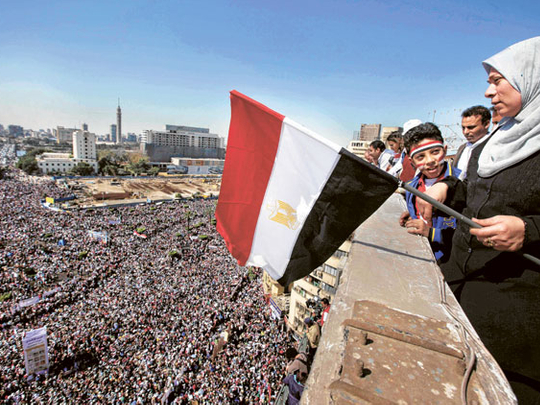
The world, especially the Arab community, was mesmerised by the events in Egypt’s Tahrir Square. People were glued to news channels on their televisions monitoring the birth of a new dawn in the region. Arabs never expected or dreamed of such a new era.
Yet the young, or the so-called internet–savvy generation, proved that internet games and social networking sites cannot distract them from national concerns and issues. In fact, they have been at the nerve centre of the nation. They surprised us by representing the conscience of the nation in words as well as action.
In focus: Unrest in the Middle East
The youth-led revolution has gained strong support from various sectors of Egyptian society and Arabs to become a revolution of the masses. The Egyptian uprising has helped revive the Arab spirit we thought had died.
Serving as the symbol of the 18-day revolution, Tahrir Square saw the birth of a new Egypt without the need for inspirational leaders. The revolt was leaderless and no particular parties were behind it.
It was a show of people power led by young people who showed a high degree of responsibility in terms of discipline. The world was impressed and surprised at the level of discipline and focus the revolutionaries demonstrated. They showed utmost responsibility by handling and organising the protests in a highly civilised manner.
Surprisingly, with the withdrawal of security forces from Egypt’s streets, not a single case of sexual harassment, assault on a church or a mosque or any kind of violent incident was reported as was the case when police and security men were deployed in the streets.
Taking charge
When the government withdrew all the security forces and released thousands of criminals in order to spread fear and chaos across the country, the people immediately organised and established protection and security teams and neighbourhood watches to protect their families and neighbours.
It was a phenomenal scene to see motorists adhering to traffic rules and signals even after midnight when the streets were empty. Bad behaviour, such as throwing cigarette butts and garbage on the street, declined, demonstrating the deep-rooted culture and civilised attitudes of the Egyptians.
With firm will, determination, unity and courage, the Egyptian masses managed to courageously face the repression of the state, defeat the authoritarian regime and regain the country’s and their dignity.
Here credit must be given to
Al Jazeera for its phenomenal live coverage of the Egyptian revolution. It has not only played an undeniable role in cementing Egypt’s democratic future, but also transmitted the ripple of people’s power and the hope it inspires in all those sitting thousands of miles away from Tahrir Square.
Despite the closure of its office in Egypt, Al Jazeera, which has been reshaping the Arab media since its launch, made a conscious effort to mirror the momentum of the revolution on the ground through its live streaming on the internet and through Facebook. Many Egyptian journalists and individuals volunteered to provide it with news material, most of which was recorded on mobile phones.
What happened in Tahrir Square is an iconic event that signifies collective expression. The revolution is also a reflection of the character of the people and the greatness of their civilisation.
This unprecedented revolution goes beyond all thoughts and expectations by former leaders and reformers. It is also an expression of the nation’s conscience towards the Tunisian revolution.
Historical context
The two revolutions gained such a significant dimension because they came within a historical context — the developments in Afghanistan, Pakistan, Iran, Lebanon, Palestine (home to the stone-throwing children), Iraq, Turkey, and Sudan. And also other events that hit our region in the wake of the 9/11 attacks and the global financial crisis.
The gains of the Tunisian and Egyptian revolutions must be preserved by creating mechanisms that listen to the people in keeping with the requirements and facts of the modern age so as not to hamper the interests of the nation and citizens.
As we live in the age of information technology, open space, TV news networks, internet and mobile phones connected to the internet, Facebook and YouTube as well as the age of democracy, any negligence in reporting events will be a global scandal. No events can be concealed from these means and tools of information.
Closing media offices or cancelling of licences will not be of benefit, nor will it prevent people from finding their own ways to access information.
Hence, wise political leaderships are ones who create an open atmosphere for their people. This is the only way to avoid costly revolutions and conflicts and catch up with the modern world and live up to the spirit of the age.
Saqr Bin Zayed Bin Saqr Al Nahyan is a Dubai-based author.








